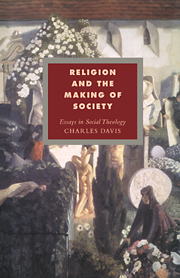Book contents
- Frontmatter
- Contents
- General editors' preface
- Acknowledgements
- Introduction: from the secular to the supernatural
- PART I Society, religion and human agency
- 1 Society and the critique of modernity
- 2 The present social function of religion
- 3 From inwardness to social action: the transformation of the political
- 4 The Christian question to radicalism
- PART II Praxis, narrative and religious language
- PART III From the modern subject to the postmodern self
- PART IV The option for the future
- Index
- Cambridge Studies In Ideology And Religion
4 - The Christian question to radicalism
Published online by Cambridge University Press: 18 December 2009
- Frontmatter
- Contents
- General editors' preface
- Acknowledgements
- Introduction: from the secular to the supernatural
- PART I Society, religion and human agency
- 1 Society and the critique of modernity
- 2 The present social function of religion
- 3 From inwardness to social action: the transformation of the political
- 4 The Christian question to radicalism
- PART II Praxis, narrative and religious language
- PART III From the modern subject to the postmodern self
- PART IV The option for the future
- Index
- Cambridge Studies In Ideology And Religion
Summary
In the context of my argument in the previous chapter that social and political activity is today the privileged locus of religious experience, I want to ask how far radicalism is compatible with the Christian faith. Christian belief in a transcendent Kingdom as the ultimate fulfilment of human solidarity imposes limits to what can be expected from politics in seeking fundamental change in human society. But first, since radicalism is an unusually vague term, I must make clear the meaning I have in mind.
In the widest sense, ‘radical’ is used of those political and religious views that push to an extreme their demand for change in the existing order. It is generally associated with a movement for fundamental change, but the exact change desired has differed from period to period. Moreover, although most often used of left-wing democratic movements, ‘radicalism’ does sometimes designate right-wing oligarchical movements calling for a regeneration of society.
My concern is with a more precise meaning. By radicalism I mean the belief that human reason and will are powerful enough to overcome the present imperfection of the human condition by basic social and political change and thus to create a completely new social order of liberty, equality and fraternity. There are several elements in the definition.
First, there is the idea that social and political change, if thorough enough, can remove the present evils of the human condition. This reflects the gradual weakening and loss of belief in the doctrine of original sin. From the Renaissance onwards,there was a reluctance to accept that human beings were intrinsically implicated in a reign of sin and thus in permanent need of a supernatural redemption.
- Type
- Chapter
- Information
- Religion and the Making of SocietyEssays in Social Theology, pp. 63 - 74Publisher: Cambridge University PressPrint publication year: 1993



